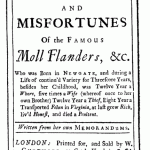Tuesday, August 15th
Class Introduction: What is History? What is Theory?
From Culler’s Literary Theory: a very short introduction. Oxford: Oxford University Press, 1997).
“It is not the theory of anything in particular, nor a comprehensive theory of things in general. Sometimes theory seems less an account of anything than an activity – something you do or don’t do.” (1)
Richard Rorty’s definition: ‘a new kind of writing has developed which is neither the evaluation of the relative merits of literary productions, nor intellectual history, nor moral philosophy, nor social prophecy, but all of these mingled together in a new genre” (from Consequences of Pragmatism ; qtd. in Culler 3)
“Works that become ‘theory’ offer accounts others can use about meaning, nature and culture, the functioning of the psyche, the relations of public to private experience and of larger historical forces to individual experience.” (4)
Thursday, August 17th
How do you define the novel as a form? In what ways does Moll Flanders conform to or disrupt that definition?
OED (Oxford English Dictionary) Definitions of the Novel (accessed through libs.uga.edu, then the database)
Defoe, Moll Flanders: Look over the original frontispiece, read Defoe’s (3-7) and continue to the end of pg. 25
Introduction and Genre Theory (McKeon xiii-xviii and 1-4)
Robert, from Origins of the Novel (McKeon 57-69)
Important Terms to Define and Understand: Fiction, Narrative, Novel, Dialectical Method, Genre, Aristotelian Modes, Hermeneutics
Reading Questions for McKeon:
What relationship does McKeon propose between the novel and history?What relationship does he propose between dialectics and the study of the novel?
What does McKeon mean when he argues that “the special vulnerability of the novel may rather be one
of its special functions” (4) ?Reading Questions for Robert:
Why does Robert characterize the novel as an “upstart,” “colonizer,” and “swindler” at the beginning of her essay?
Frye, from Anatomy of Criticism (McKeon 5-13)
Important Terms to Define and Understand: fiction, the romance, autobiography, the confession, Menippean satire, the anatomy
Reading Questions: What relationship does Frye pose between Jane Austen and Emily Bronte? Why is this important to his attempt to articulate the complexity of genre theory in relation to the novel?
What is the distinction between the novel and the romance as it is described by Frye? [Note passage where Frye’s definitions are crystallized.] Follow the same method in distinguishing between the novel and autobiography; the novel and the anatomy.
How do Frye’s “formulas” assist him in his brief analysis of James Joyce’s Ulysses?
***
Tuesday, August 22nd
Moll Flanders (26-187, to “. . . my first Step was lucky enough.”)
In addition to today’s reading, you need to complete the assigned critical material listed on the schedule for the 17th. The reading questions and terms to define and understand are meant to aid you as you read this new material; you do not have to formally respond to them in writing, (although I might ask you to briefly engage with a question or two at the beginning of class)
Thursday, August 24th
In-Class Writing: What did you take to be Novak’s main point? What evidence of his did you find most compelling and why?
“Since the novel’s purpose is to deceive, lying is the law by which it abides and to which there is little pint in being unfaithful since its reality derives from it” (Robert, from McKeon, pp. 66)
Finish Moll Flanders
Johnson, [On Fiction], from Rambler, No. 4 (1750) (.pdf)
Rivero, Editor’s preface to Norton Edition (Moll Flanders vii-xi)
Novak, “’Unweari’d Traveller’ and ‘Indifferent Monitor’: Openness and Complexity in Moll Flanders” (Norton 369-390)
Techniques for Reading Literary Criticism
Identify the author’s argument. Be prepared to look for a thesis paragraph or even a series of statements and “proofs.”
Be prepared to summarize that argument.
How does the author support his or her assertions? What evidence do you find the most compelling? The least convincing?
Can you see yourself employing the critic’s argument in your own analysis of the text?
***
Tuesday, August 29th
Toni Morrison, A Mercy (1-118)
Culler, “What is Theory?” (.pdf) and “Narrative” (.pdf)
Important Terms to define and understand: narratology, events/plot, story/discourse, point-of-view (first-person, omniscient, limited), intrusive narrator, unreliable narrator, narrator/narratee, focalization, focalization variables (temporal, distance and speed, limitations of knowledge)
Reading Tasks for A Mercy: Characterize each narrator in the novel based upon your reading about focalization and the variables that influence effect it.
Notes / Culler on Theory
Notes /Culler on Narrative
Thursday, August 31st
A Mercy (Finish Novel)
Culler, “Toward a Theory of Non-Genre Literature” (McKeon 51-56)
“Each novelist, each novel must invent its own form. No recipe can replace this continual reflection” (Robbe-Grillet, qtd. in McKeon, pp. 51)
Link to James Joyce, Finnegans Wake, Book I, Chapter I
In-Class Group Assignment: Each group will be assigned one of the five questions asked by narratologists and will then discuss how that question might be answered in regards to Toni Morrison’s A Mercy. We’ll then reconvene as a class and each group will share their conclusions, citing at least 1 or 2 sections of the novel specifically.
Notes on A Mercy and Temporal Variable
Schedule for September
